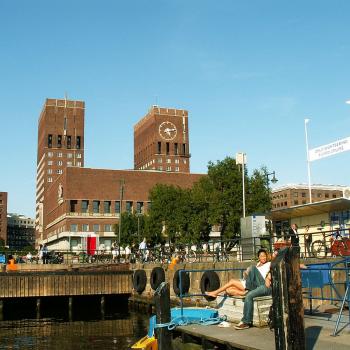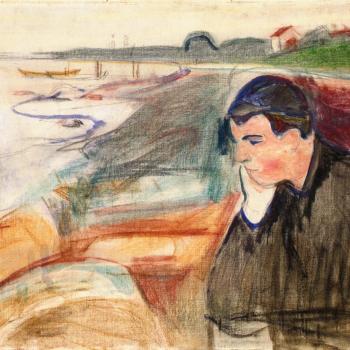- How did these experiences and relationships prepare you for your spiritual life as an adult?
I have known the curiously perverse pleasure of calling myself an atheist before, but never have I felt that I could ever act in some meaningful way on the sound of those words rippling through my mind’s hoard of religious memories, words, blessings, injunctions, prohibitions, and commandments. For some years I had an antagonistic relationship to the word spiritual; I seemed to sense it was the term clung to by those who wanted some foggy cloud of Godliness to descend upon their mundaneness, rather than by those who were burdened as I was, as my patriarch Isaac before me, to be bound and chained by the occasionally life-giving and occasionally life-taking constraints of the Law. The latter state seemed to me to be signified by the vaguely Greek sound of the word religion, and even if I would catch myself beginning to warm to the possibility of leading that life that seemed to me deliciously empty of values and prescriptions inherited from several thousands of years’ of debate over the language in books still thousands of years older—even as I would find myself drawn to that so-called secular existence, the ground upon which I walked was one of religion. The Australian writer Gerald Murnane talks of his mind as a landscape the furthest extents of which are bordered by hazy regions where horse races are being run and the results from which horse races appear as glints of pink or purple or orange in a blackening sunset over a distant horizon of mind; I think of my mind as being bordered at its fading edges by snatches of the sounds of prayers and Bible verses and half-empty images of the places where such sounds were sounded and of the people with whom they were made by myself—those I knew personally and those I had read about in the endless chain of Abrahams Isaacs and Jacobs leading back by winds and twists somehow to God himself. I flirted with Zionism as a way out; a secular but still solidly Jewish belief system that could furnish me with the secular freedom I had wanted if not with the escape from the circle of Jewishness. That Zionism could not quench my thirst seems in retrospect as inevitable as Hagar’s begging for water after being exiled to the desert of Paran. I gradually drifted back to Judaism, first with the same fascination that some midcentury academics felt towards the systems of mysticism about which they had written their dissertations and from which their thirsting souls were slaked by waters of colors of spirit more various than any on view in the museums of their urban atomized secular lives, then with the peculiar sense of homecoming that my ancestors, children of children of children of Jacob or Israel, having abandoned their shackles in Egypt, having sung to their liberating God as their tormentors and enslavers drowned in the water that split and was unsplit by miracle alone, felt as they finally approached the outer reaches of the promised land of Israel, where they saw only dry crags of a seemingly-endless desert horizon of maddening similitude, a long and flat vista over which were sprawled the shapes of hills and mountains stretching in prayer, bending their geological roots towards Jerusalem, knowing that on one of these they will soon be receiving by birthright and covenant those six-hundred-and-thirteen commandments of God whose image will glow and swoon inside them for all the years of their lives lived loving Him and His word, and Who will receive them, judge them mercifully, and extend toward them always and without rebuke or reproach a ladder of refuge from the void and waste of the world—then they would feel, as their sandaled feet first tread over that Land from whom their eponymous ancestor had descended and to which they had now finally and circuitously returned, a feeling so hopeful that even the birds migrating across the Mediterranean who know their way down the unmarked lanes of vast blue sky could not hope to feel (for their flitting back and forth year after year is less departure and arrival than continual movement) as they returned again to that place in which they had felt most themselves, where they had seemed to sense most their deepest connection to all that had made them who they were and all by which they were joyously alive in their moment and in their world in all its unacceptable various contradiction, but from which they had felt a season earlier some urgent need to leave that they could now hardly explain to themselves, because they had come home now, back to where they always where inside.
- How do you relate to your community now?
William Faulkner once remarked that for all he felt of the South’s injustices he would, if impressed or otherwise compelled to fight for an army of theirs, commit to his duty without feeling even the crudest of selfish doubts stir inside him. My Community is my own; it is all I have. I feel no more comfortable at Syrian affairs then I do in the halls of the academy. But if I were forced to fight for a Syrian army against any of the various enemies of ours I have heard so often and so viciously condemned, I would not so much feel the doubt that Faulkner claims he would not know even a fragment of as I would likely implode or shatter under the combustion of the various worlds in which I seem to myself to be no more than a friendless immigrant.
- Anything else you’d like people to know?
My sentences are just as long and meandering in my own writing, which no one reads but which I toil at by night, chronicling further some of what I only refer to in passing above. I should like to claim I’m planting these long sentences for you and you alone, dear audience of my dear friend Chase, but I find I cannot write English except to venture so far beyond any established antecedent as to forget myself (how much more so my sentence) of what I am supposed to be talking about or addressing.













